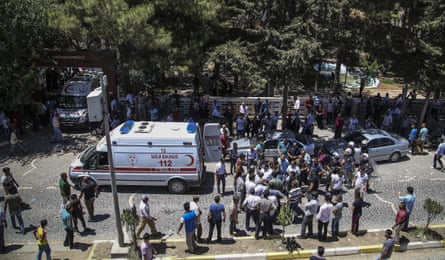At least 30 people have died and dozens more were injured in an apparent suicide bombing in a Turkish town near the Syrian border in one of the most serious incidents yet of violence from the Syrian war spilling over into its northern neighbour.
Speaking at a news conference, the Turkish prime minister, Ahmet Davutoğlu, said that preliminary findings pointed to Islamic State having carried out the “clearly terrorist” attack but he added: “We are not at a point to make a final judgment.”
The blast hit a cultural centre in the small town of Suruç, where young people from the Federation of Socialist Youth Associations had been gathering for a press conference before a planned visit to the Syrian Kurdish enclave of Kobani to assist with its reconstruction.
Suruç lies across the border from Kobani – the town that witnessed the defeat of Isis militants at the hands of Kurdish fighters last year.
Monday’s bombing was the bloodiest such attack on Turkish soil since twin bombs killed at least 50 people in the border town of Reyhanlı in 2013. Two senior Turkish officials told Reuters that initial evidence made them suspect that Isis was responsible, saying it was “retaliation for the Turkish government’s efforts to fight terrorism”.
Photographs circulated on social media showed bodies strewn in the garden of the cultural centre. The youth organisation published a photograph just before the blast showing its members gathered at a table in the garden.
The victims had reportedly planned to travel to Kobani to deliver toys, plant a memorial forest, as well as build a library and a playground.

Local hospitals told Turkish media that 76 people were wounded in the bombing, several of them severely. The ministry said the death toll was expected to rise. “I saw more than 20 bodies,” one witness told Reuters by telephone. “It was a huge explosion, we all shook.”
The identity of the attacker has not yet been established, but Turkish media speculated that it may have been an 18-year old female suicide bomber for Isis.
Turkey’s president, Recep Tayyip Erdoğan, condemned the bomb attack and those “who conducted this brutality”. “Terror has no religion, no country, no race,” he said.
The British ambassador to Turkey, Richard Moore, said on his Twitter account: “UK stands shoulder to shoulder with Turkey in condemning unequivocally all terrorism. I have kids that age.”
The pro-Kurdish leftist Peoples’ Democratic party (HDP) also denounced the attack. In a statement published by the party’s co-chairs, Selahattin Demirtaş and Figen Yüksekdağ, the party harshly criticised the Justice and Development party (AKP) government and argued that the attack aimed to “break international solidarity for Kobani”.
“All countries and regimes from which Isil [Isis] has received support are partners in this barbarism. Those who keep silent and do not dare to raise their voice against Isil, governors in Ankara who are threatening the HDP every day and protecting Isil, are accomplices to this barbarity,” the statement read.
The HDP also blamed the government for the lack of security measures along the Syrian border, a concern shared by Turkey’s Nato allies, which have been urging Turkey to step up surveillance along the porous 250 mile (400km) strip across which many foreign fighters have made their way into Syria.
After coming under increased pressure, however, Turkey has recently intensified efforts to crack down on Isis activity inside the country. Last week the authorities arrested several men suspected of recruiting members for the militant group in Istanbul and the capital, Ankara.
While underlining the party’s peaceful and democratic stance, the HDP also called on locals to “take their own security measures” against similar attacks. Some fear that the increased tension in the Kurdish region along the Syrian border might reignite fighting between Kurds and Turkish security forces and derail the ongoing peace talks between the Turkish government and the outlawed Kurdistan Workers’ party (PKK).
Turkey’s Kurds have long been angry at what they perceive as Turkey’s inaction against Isis activities inside the country and at Turkey’s borders, and many Turkish Kurds believe that Ankara directly supports the Islamist militants against Kurdish fighters.
The PKK also blamed the Turkish government for Monday’s bomb attack, arguing that Ankara had “supported and cultivated” Isis as a weapon against the Kurds.

On Monday, another suicide bomber in a car targeted a checkpoint in southern Kobani manned by the YPG, the main Kurdish militia in Syria, according to the Syrian Observatory for Human Rights, a monitoring group with wide contacts inside the country.
It was the latest attack against the enclave, which emerged as a symbol of Kurdish defiance against Isis. After months of ferocious fighting backed by air strikes by the US-led coalition, Kurdish militias were able to regain control of Kobani after an ill-fated assault by Isis last month that saw the militant group lose hundreds of its fighters. More than 200 people were killed in the assault – one of the largest single massacres of civilians by Isis since the Islamist militants emerged in Syria two years ago.
There was no evidence that Monday’s attacks were coordinated, though the bombing in Suruç is a dangerous escalation against Turkey.
Turkey also backs a number of rebel groups fighting to overthrow the regime of Syria’s president, Bashar al-Assad, who is combating a rebellion now in its fifth year. Turkey hosts 1.7 million registered Syrian refugees who have fled the conflict.
Kurdish militias allied with Syrian opposition fighters have recently ousted Isis from large tracts of land near the Turkish border, including the town of Tal Abyad, a key stopping point for foreign fighters.
The advances sparked concerns in Turkey, which fought a long-running insurgency with the Kurds, that their old nemeses were carving out an autonomous zone of control. The public concern sparked talk of a possible Turkish military intervention and an expansion of its presence on the border.